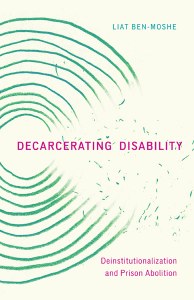Teen Vogue: What Defunding Police Means for Mental Health Care
 In her book Decarcerating Disability: Deinstitutionalization and Prison Abolition, Ben-Moshe outlines how people fought for a new paradigm in mental health treatment before. Beginning in the 1960s, widespread deinstitutionalization sparked by disability activists shut down asylums across the country. Many see this movement now as a failure because it led to more people with mental illness being herded into jails and prisons. But Ben-Moshe argues that this was a pivotal step in abolition by grass-roots organizing. It just so happens that privatization of care and a punitive culture kept people from having autonomy over their livelihoods. Going back to our activist roots could be the answer to that.
In her book Decarcerating Disability: Deinstitutionalization and Prison Abolition, Ben-Moshe outlines how people fought for a new paradigm in mental health treatment before. Beginning in the 1960s, widespread deinstitutionalization sparked by disability activists shut down asylums across the country. Many see this movement now as a failure because it led to more people with mental illness being herded into jails and prisons. But Ben-Moshe argues that this was a pivotal step in abolition by grass-roots organizing. It just so happens that privatization of care and a punitive culture kept people from having autonomy over their livelihoods. Going back to our activist roots could be the answer to that.
"The only way peer networks are going to happen is through people who have direct experience. And it doesn't have to be state-funded,” Ben-Moshe says.
Read the full article at Teen Vogue.



